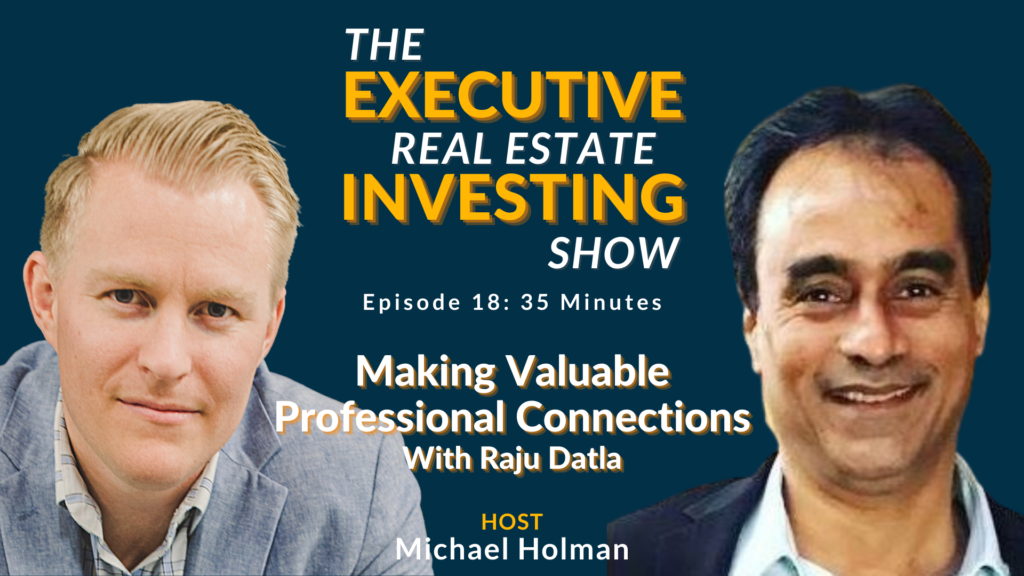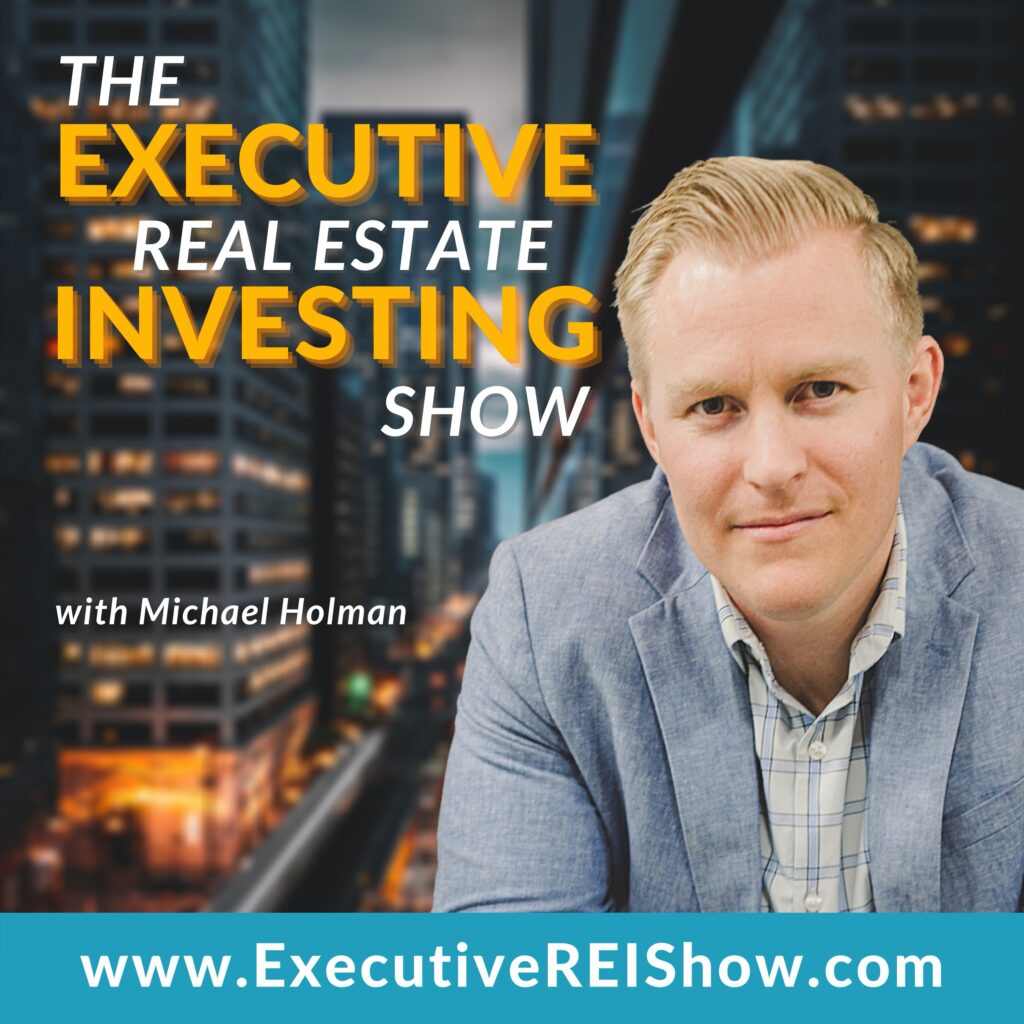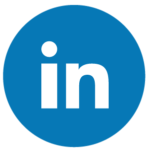
The executive Real estate investing Show
EPISODE 18
Making Valuable Professional Connections With Raju Datla
- October 4, 2021
EPISODE SUMMARY
This week on the show, host, Michael Holman talks with Raju Datla. Raju spent almost 26+ years of his career in Technology in various roles, from Software development to leadership. He dabbled Tech startups before venturing into Essential services business 4 years ago, that has led to real investing also. He has done passive and active (airBnb), and is looking to do more investing in both residential and commercial real estate. He also helps Investors/Realtors increase their profits/revenue on their deals.
Apart from his real estate and Essential services interests, Raju Datla is very passionate about Personal Development, Spirituality, Mindset. His podcast, with his partner called Vibe! Mind, Body & Entrepreneurship is about Mindset, spirituality and Entrepreneurship.
Listen now to learn from Raju Datla on how he makes valuable professional connections.
EXECUTIVE TIP
Play Hard, Work Hard
LISTEN TO THE PODCAST HERE

The Executive Real Estate Investing Show Podcast
EP 18: Making Valuable Professional Connections With Raju Datla
Listen on
READ THE TRANSCRIPT HERE
Note: Audio transcription has been automatically transcribed
Welcome to The Executive Real Estate Investing Show. This podcast is for you, the busy business owner or executive looking to create generational wealth. Here, we’re going to show you how to do that through real estate investing from multifamily to industrial and everything in between. You will become a real estate investing expert. And now, here’s your host, Michael Holman.
Michael Holman: Hello everyone, and welcome to another episode of The Executive Real Estate Investing Show. I’m your host, Michael Holman. I’m excited to have you with us here today. And like always, we are going to start with the executive tip and today’s executive tip actually comes from my brother.
As I was going around, I was asking people, Hey, what, what advice would you give to the world? So, my brother, Dave, this one, it comes from him. And I very much resonate with it. He said, my advice that I would give my executive.. his executive tip was you need to be willing to play extremely hard, but you also, at the same time need to be willing to play very hard, right. Have that mindset. And that doesn’t mean a perfect balance of like nine to five. He was telling me. And I completely agree. Sometimes that means you work, 13, 14 hours a day, but you have to balance that out. You can take a week vacation at some point with your friends or your family or, or whatever way you play… So today’s executive tip. Play hard, work hard. Make sure you’re doing both.
Once again. I’m your host, Michael Hohman and today we have a very special guest with us. I’m really excited to have him with us. His name is Raju Datla. He is all over the place. He’s all over LinkedIn. That’s actually how I first found Raju.
He started his own podcast. He’s a full-time it professional. He’s a real estate investor, both active and passive he’s, he’s a personal development junkie and I’m really excited to get into that. Raju were definitely going to have to spend some time on that. Cause I too am a love personal and professional development, but welcome to the show.
Raju Datla: Thank you, Michael, are you, you’re being too kind of, I don’t know. You’re publicizing up, hyping me up too much. I hope I, you know, come to 10% of what you’re saying. All right.
Michael Holman: No, I love, I love it. And honestly, I’m really excited. So, I just want to kind of get into things, whereas you, if that’s okay. Cause you, you have all this diverse experience and background, right?
I mean, you’re, you’re in it, your real estate. You’re in podcasting essential services. You have all these, these different items and these different, you know, past history and backgrounds. Tell me, tell me about all this. Like how did you get involved in so many different things?
Raju Datla: Sure. So, like for you, there’s good a little bit of a personal story. So, four years ago you know, a little bit or four years ago, my divorce was finalized and I’m an IT guy. I was looking for options to create more income, you know, that changes the financial situation a lot. So, I was looking at stuff. Because I’m it, and that’s what I was looking at, but my best friend and something happened and he wasn’t feeling well, so it never worked out.
And meanwhile, somebody introduced me to this central services business, my ex-boss, actually, and that hit me. I’m like, that was more like a side hustle. I’m like, all right, this can make me some few extra. You know, while I try to find something else in the future, but that what they’ve led me to a lot of real estate professionals, real estate investors, a lot of them that are involved in the business.
And that led me to my first passive investment. I was the first thing; the second thing was personal development. One of the company conventions, I went to you know, the co-founder owner chairman stood up and said, think and grow rich. If you think any business or anything you do is going to be easy.
You better forget it. Nothing. You read this book, this little going to change your mindset. And yeah, for me, I follow whenever somebody says somebody successful says something, I follow it. Pretty much started on the path, pretty much became a junkie. I go a hundred percent, but if something holds me and I’m a hundred percent in, there’s no bag.
There’s no like you know, on Bitcoin, I just go in. So, yeah, it’s been there. And then I, since then being in landmark if anybody knows about landmark worldwide, it’s a personal development, personal transformation. So that’s something I’ve been involved in for two and a half year or so, kind of that, you know, so the podcasting, same thing I started last year, I guess, getting back into podcasting last year before pandemic.
I want it, so, I try to network with people, like reach out to real estate investors, realtors, all this stuff, because one of the things essential services can do is provide them that extra cashflow if they so choose to. So, I tried to figure out like, okay, I can reach out to them, but if they don’t want to do business, what other value can I provide?
So one of the things I figured out was okay, if I can do a video with them, if they want to give their businesses. I can do a LinkedIn video, get their video out information sharing, you know, so that’s how it started. And then last year, my partner and I partnered up on podcasts. She and I were into similar things, you know, spirituality mindset, personal development.
Michael Holman: There are so many things there that I kinda just wanna, I wanna unpackage. So, so to start off, right? I mean, you’re talking about spirituality, you’re talking about personal development. I’d love to hear more about that. What, what on your personal development side, what are some of the things that you’ve been doing or books that you’ve been reading along the personal development and spirituality.
Raju Datla: I’m like a junkie right now. I just finished the power of now by Eckhart Tolle. Hey, wasn’t that amazing book about being in the now, which is it, which I’ve read several of the books, but his perspective is completely different. How we put this it because we are always, we’re always called.
And we’re only living always, you know, every human most humans are living in the past or the pro you know, are the future. They’re not living in the moment right then. So, one of the things I learned in that book is in the moment in the now there’s no, there’s no sadness in the mountain in the now is always joy.
There’s nothing to be sad about. It’s only when you’re stuck in your past are in the future. You see where you see a lack or where you see a pain from the past, into the future is when you get like, stuck in that. And that’s very experienced the pain. I mean, that’s one of the tips, so yeah.
Michael Holman: Awesome. No, that’s, that’s really interesting.
I mean, I think about that, right. Where, and as you’re saying that I’m kind of relating it to my own personal experience. Right. And, and I was just thinking about some frustrations I had even earlier today. And, and most of it is related to stuff that I know is coming up in the future. That’s going to take a bunch of my time.
Right. And that’s why I was getting no, that’s where the frustrations were stemming from. It wasn’t stemming from anything that was happening right then and there. Right. So that’s, that’s fantastic. Well, and you talk about, you talk about spirituality. You know, I think, I think that’s something that’s really important for a lot of people and especially.
You know, a lot of the listeners that we have a really high powered (inaudible), right? They’re business executives, they’re business owners, or they’re aspiring business executives and business owners. And they have a lot of ambitions. And so, you don’t often hear, you know, spirituality coming up as a part of that.
Maybe, can you just take us on a, on a brief path on, on, you know, where did, where did you kind of gain this sense of spirituality and what that means to you?
Raju Datla: I’ll go back to my, even my childhood, you know, I grew up in India, so kind of tend towards the spiritual side because you know, you know, I was born certain religion, but you know, Hindu religion is not really like a religion.
Very good stuck through certain things only. It’s more about oral, spiritual side than a religious side. I grew up in that, but at 14, 15 years old, I read actually I read the Bible and everything. So, it wasn’t just like Hindu. I read everything by 15. I’d read him in the Bible. I read like a three fourth of the Bible at one point.
So one thing I decided was every religion teaches similar things. Once you start reading. So anyway, I went into this phase where our God doesn’t exist. I don’t see a God there’s no, God. And there’s all, all these really genetic causes only a strife and all these killings and all that stuff. So, I got into the more I became an atheist essentially.
I wasn’t like a hardcore where I would like, you know, have fights with like religious.
You know, I don’t believe it. That’s fine. You believe it, great good for you. As long as you don’t force me, I’m good with you. But that changed about three years ago in the personal development journey.
When I heard Bain dire talk about spirituality and God. And he went to end up, you know, you know, long story short is that God exists in everything, plant everything. You, you are God. And then that got me into a deep rabbit hole. You know, then I went to quantum theory. Quantum theory is, or quantum physics is like observer effect.
You know what you see. Is what happening and what you observe is what happens. Yeah. And there’s a lot of science behind it that ultimately say is that like every, everything is made up, what, the same thing. They’re basically energy just bonded together. So, if you go deep into it, you know, you can believe God is out there, but really God is everywhere.
Yeah, our, whatever you call it, a universal force, whatever, you know, I don’t, I call it universal for, so you could only come, somebody can call it God. But the basic fact was that’s where I went deep, deep study, and then realized like, yeah, I was wrong. Yeah.
Michael Holman: No, that’s, that’s, that’s very, you know, that is such a personal journey.
And I, and I love you sharing that with us because, you know, that’s, that’s a journey that kind of makes up who we are. And especially as busy, like I said, as business owners and business executives, it’s oftentimes necessary for us to take a step back from. The business that we’re doing, right. To just think about whatever your religious beliefs or whatever, you know, your faith or anything like that.
Just to take a step back and try and look beyond just, you know, what is happening right then and there. And, and oftentimes that can help give you know, purpose and meaning to a lot of the things that we’re doing. Even tied back all the way to our business and our families and everything like that. So really, really appreciate you sharing that with us.
I kind of want to go even back further. Now, you, you said you. Started in the tech world. What was your, what was your journey through the Texas?
Raju Datla: So, yeah, I mean, back when I was 17, 18, I was, I wanted to be a mechanical engineer. That was my goal. And this is back in, you know, are you ever talking our board mid, mid-eighties, you know, older than you might.
Oh my Lord. But my dad at that point, my dad was. I’m lack of terms here. It was a bureaucrat, you know, high level bureaucrat back in India most on the police side, but anyway he said, hey, go look at these things called computer. They’re coming out now. And I looked at it and that’s it.
I felt instant love. I saw like this was a green-screen box. You know, thing, when I started, it was like 16 Gail or something was like high level memory, you know? And that’s it pretty much, I fell in love and that’s what I wanted to do. I did my undergrad and then I came to us, really my dad and my uncle kind of convinced me to come here and I didn’t want to come.
It wasn’t, it wasn’t a thing for me because I didn’t, you know, monetarily, I was, you know, law off, you know, my dad wasn’t aloft, so I didn’t need to come here. But my dad said, okay, go there. You know, get two years Stickley and come back and then build, you know, Frank you some money and we can establish a business from the connections you create there.
But two months here, I decided this is where I want to live. This is my country where I want to live. And I never thought about anything else that it, because I was passionate about technology. So, I did various roles pretty much, you know, any from software development to leadership roles.
But yeah, three, four years ago, two years ago, three years ago, pretty much got tired of the corporate culture. Now I’m still working, you know, full-time consulting still, but that might change in a year. I might, you know depending on how my other businesses generate enough income, you know, IDV get paid decent salary.
Michael Holman: that’s awesome. So, what caused you to make that switch? I mean, you kind of mentioned tired of the corporate culture. Was there any other you know, situations or actions that really caused you to think, Hey, I need to, I need to rethink where I’m currently seeing.
Raju Datla: Yeah. One is obviously that the corporate culture, I didn’t, I mean, I’m a man I’m, you know, the type of management I like and what I do was completely different.
To what the corporate culture is. I don’t call it management. I called leadership versus management. There’s a huge difference. A lot of people in the leadership role don’t get that one. And then there is a lack of empathy you know; I can get into all those details. If people are being in the corporate culture, there’s this curve you got to do.
You got to rate people are cornering decorum, that’s all BS. I think because if somebody is good, somebody who’s good. You can curve him against somebody else. That’s seems like a nonsense to keep it out of keep somebody down, I guess. But that was one. The second part was I realized I wanted to make a difference.
And the only way I could do it was these essential services or other side bare. I wanted to change lives. And that was the business was the only way to do that for me is like my, my ambition is that I’m going to change that. Either to coaching or mentoring, whatever the case is as I grow. And I’m being mentored obviously by several people.
And then, yeah, I want to pass it on to mentor people and coach them. So that’s, I mean, I’ve did do that in it wrong too, but it’s not, it doesn’t make a person financially.
Michael Holman: No, but that’s, that’s, you know, I can, I’m very, I can very much relate to kind of the journey, right? I mean, I just look at it even when I’ve done, right.
I came from a corporate culture when I left the company that I did right before I joined Overland, I went from a company that had over 220,000 employees worldwide to a company that had less than 20. Right. And so, but, but I kind of did for the same reasons that you were talking about, right? I mean, you want it to, to make a difference.
And that was one of the things that I noticed when you take that jump, you know, and I, and I really, I actually really enjoy, you know, Corporate structure, corporate culture. And I, and I, and I jive with that really well, but the hard thing for me is I didn’t want to wait. You know, however many years I needed to wait before I could really start making a difference.
And that’s why the jump happen is all of a sudden now, right? You can really start making an impact in people’s lives and on a business very early on. So, I can, I can really relate. And then, you know, all the way down to this podcast or. You’re talking about helping other people changing lives. I know you started a podcast.
That’s why we started this podcast is, you know, how can we, how can we better people’s lives? How can we help them, you know, become more financially free so they can spend more time with their family as they transition, you know, through the, through that process? So that was, you know, your journey. I feel like.
You know, there’s, there’s unique parts of it, but I feel like what you’re talking about is so relatable to so many of the people who are listening to the show and why, you know, I think a lot of them can kind of relate to the journey and the experiences that you’ve had. Now Raju, one of the things that I know you’re.
Really being good at it. And you’ve been focusing on over the last little bit it’s just, you know, building your network and connecting people, you know, what, what are, what are the means or how are you going about to build your network and to connect to
Raju Datla: Yeah, sure. So that’s one thing I learned from the book, the Go-Giver by Bob.
So now that’s more, you know, the bay, he does it, you know, our, you know, talks about in the book is like, you go to networking in mind, you go talk to something and then find out what they want. And you figure out somebody else who can, you can connect to and then connected together or provide some value.
And that’s how you build a network because that’s creates a relationship, and somebody actually thinks. This guy actually cares. And you know, it’s not just looking to get something for himself, that’s it? I mean, yeah, we all want to get something for ourselves, but you also, if you go, you know, the philosophy with the Zig Ziglar, which is on my, anybody sees my LinkedIn profile, it is there, the more people help you help get what they want.
You get more. Get what you want. And pretty much that’s my philosophy. That’s how I started like figured out. Okay. One thing I can do is whenever I connect to someone, ask them who they would like to connect to or who are the type of people. Right. And then as soon as I find somebody that already knows someone great, I’ll connect them immediately.
So I pretty much on purpose, right? Of like on that day, try to connect them to one or two. And that’s all I started building. And then the second one, I wanted to figure it out like, okay, what else can I do? And also put my name on there. Like if you’re in the business, you become your brand. That’s what you know, anybody should understand is why we do podcasts.
Anybody does podcast is put your name out there so that people can relate to you. Right. And connect to you when you connect with them, they already feel like they know a little bit about you or at least trust you. So that’s the other one I just said, okay, I can put somebody’s name. So, I, I met Michael and Michael.
Once, you know, these type of people to come back, all right. Why don’t I interview Michael and put his name out there and say, Hey, if my goal like rhymes or jives with you or connects you, why don’t you reach out to him? This is what he does. And you know, and you share what you share. So that’s another way.
And the podcast is, yeah, just like you are doing. It’s more about personal development. We just want it. Interview successful people, their journey, their mindset, their spirituality, how it’s all-important ties together to create a successful business to entrepreneurship or investment, whatever it is.
Michael Holman: Yeah, I love it.
And you know, kind of digging into that a little more, what are the, what are some of the mediums, right? I mean, like I found you via LinkedIn, for example, right. That’s kind of where you and I first started connecting. You know, are you, are you doing that exclusively through LinkedIn? Are you attending events?
If so, what events? Like what are the kind of the mediums that you’re doing to, to connect with people and network with people right now?
Raju Datla: Right now, it has been pretty much LinkedIn. I used to do the in person. I mean, I am in Dallas, so we still can do in person, but I mean, I mean, I’ve made so many great connections through LinkedIn.
I don’t, the, the reason on my go to the live event is just to meet people in person just to, you know, to hi. I might like just to go there to see if I can help somebody there and connect them because I don’t know if. The quality of people I’m meeting through LinkedIn. I mean, for example, I met, you know, I don’t want to know.
I mentioned him some famous author. Let’s say I’m trying to get her to redo. You know, I would never imagine she would say yes, she said yes. And I’m trying to negotiate the timing now. So, I would go, go to a networking event and meet someone like that I wouldn’t have through LinkedIn. I just connected through LinkedIn and asked her the question.
And she said, yes. And you know, some people like in bigger pockets, I met people, a couple of people, bigger pockets, they came on there. One did our show and another one is going to do the show. So that doesn’t happen when you’re doing like in-person. So COVID has been a blessing. I think it’s a bit, you know, it forced people.
To connect remotely, all this stuff that like we’re doing the zoom now. And we probably wouldn’t have connected maybe, you know, that if it wasn’t for COVID. Right. So yeah,
Michael Holman: no, I mean, definitely things have gotten, gotten more more remote. And so that’s, I mean, that’s, there’s no denying that, right.
Remote work is more popular. Zoom is, is off the charts popular, right? I mean, I’ve used zoom a few times before COVID I’ve used zoom like a thousand times
No. I mean, you’re, you’re exactly right in there. Okay. You know, I agree. I think LinkedIn is a, is a great medium for connecting with people. Is there anything specifically that you do, I mean, are you just reaching out constantly on LinkedIn, are you trying to post a lot?
What are you doing on LinkedIn to, to try and build that network?
Raju Datla: Yeah, those two things. Yeah. Content right. Every day I post content, usually it’s like three or four more videos, you suppose the better it is because the people see you and then keep it short. Don’t keep it long. And that’s some of the lessons I’ve learned and also always try to post directly to the LinkedIn and stuff, trying to post through YouTube or something because that’s another lesson I learned.
Now eventually once you’re, you know, you never know which one goes viral. You know, I did a posting last Friday. You know, about my kids, you know, where I, they, I got them to read rich dad, poor dad, and now we all are playing together cashflow game. Yup. And that it’s a picture. It’s not even a video. And then I just wrote down what I did to get them to do it.
And that kind of like, like boom and went like, oh wow. That many likes on that many people. I didn’t think it was done. Great.
And then I reach out to people, real estate investors, anybody in the real estate investing world. I tried to reach out to, I mean, LinkedIn now allows only a hundred people or so. So, I have that, you know, I go, you know, connect with people, all this message. If I connect with them and somebody connects with me, unless they’re trying to sell me right off the bat, usually I’ll always like respond and say, yeah, let’s set up a one to one and see how we can help you, you know, go from there because I always try to see if.
If I don’t see anything that I didn’t do with them, or at least I can help them, then I’d try not to like, say anything because it’s a base. Cause I don’t feel good if I’m like trying to get right. I gotta be able to offer something of a value for them. So that’s how I try to maintain all those connections.
So now I’m like, I don’t know, getting close to nine, 9,000 times. That’s, you know,
Michael Holman: that’s, that’s phenomenal. And, and we’re going to go into one, one other thing really quickly until we get into real estate, because you just mentioned that, but one of the things that I just kind of want to, that I want all of the listeners to know and understand, right?
Whether it’s LinkedIn or another medium, there are opportunities. To reach outside of your current network and to build your network. You know, LinkedIn is just one of the ways to do that and something that’s being emphasized here. And I, and I actually love it. Right. And that’s one of the constant issues.
Right? A lot of times people get stuck in ruts, right. I don’t know how to do that, or I don’t know the right people or, you know, whatever the excuse may be, you know, whether it’s your business or whether you’re dealing with a problem at a, at a larger corporation. LinkedIn and these other tools, I mean, you have a, you have a limitless possibility to go out and reach people, pull them into your network.
And like you said, talk to people who you probably, you know, you’d have to fly, you know, out, I’d have to fly out to Dallas right now. You know, we’d have to set up a whole meeting. Yeah. Go get launched, whatever the case may be, dive the big deal, but on LinkedIn, you know, all of a sudden, it’s used a few seconds, we’re connected.
We have a conversation, right. And it just goes from there. And so that’s one of the things that I really want to point out to the listener. Whether you have a business, whether you’re a business executive, whether you’re expiring to be a business owner, right. You can create, you’ve got to create the network.
And LinkedIn is a great tool for that. Now I want to transition a little bit because you’ve talked about you connecting with a lot of real estate investors. So, you know, we’ve talked about. It and tech and you know, personal development. When and why did you start getting into real estate investing?
Yeah.
Raju Datla: So, going back to the services business that, you know, I connected with someone and then I had money in the 401k and that kind of didn’t feel comfortable with the stock mark. I’m not much of a stock market guy. So, I’m like, all right. So, someone I knew for through the business, he’s done big, he’s a big-time investor, like he’s done about 10,000 transactions in single family home.
So it’s quite a lot, a billion dollars or a billion dollars. So, I like knew him for a year and I’m like, all right, I didn’t know anything. He said, yeah, give me the money. I’ll do this, do this. I’m like, all right, I’ll trust you. And that’s how I did it. But then I started noticing like, okay, to expand my business services.
I got to connect with a lot of people in the real estate world. And then that’s how I started connecting outside of learning. You know, many of them started listening to people, talking to people, you learn more things. And that led to a lot of different connections. I did Airbnb. I just finished Airbnb.
One-on-one other properties just closed it out. Also have plans. I have offers of people, you know, I got a lot of friends who wanted to partner up, I’m going debating back and forth. Now I’m about to get into tax lien, investing. I’m actually paying to learn that. It is very, very lucrative. So, I, you know, more, I mean, I I’m expecting it to be a very lucrative based on what I heard.
Right. Everything I heard; I trust the person. So that’s where I would go. Airbnb also will be there because I planned to do doors. If I find properties that can do, I can do Airbnb on I’ll do that. But beyond that, my goal is to seven to 10 streams of income. I would say six to seven of them will for sure.
Be in real estate. It just makes sense. You know, a lot of, you know, like the multifamily or I don’t know, assisted living, you got so many avenues. Do invest passively. So, the goal is make money and dump money in various things. You know, where I can don’t have to be active. I’ll be active in one or two areas, which is the tax lien and maybe Airbnb and my services business.
Michael Holman: Yeah. Well, you actually, you, you answered the next question I was about to ask you. You’re right. So, it sounds like, it sounds like the goal is you’re is you’re trying to build up the, the passive, you know, being a limited partner, you talked about syndications and all these other things.
So, so is your focus right now? Are you kind of splitting your time between being an active investor and a passive investor? Are you trying to, are you trying to shift more to passive kind of what’s what’s your goal? How do you see that playing? Yeah,
Raju Datla: no, mostly passive right rail right now. I have another one passive joint venture going on right now.
And then the first investment came back and I’m actually looking to invest that stuff back in, right. Again, passive you know, so trying to find the right opportunity. Knowing so many people now I got a lot of options. So that means, you know, I’m looking for the right option. So, you know, with maximizes the money, I’m going to get Mac plus yeah.
The goal of you knows, going into tax lane you know, how that’s going to work is yeah. Building assets, you know, most of them will be. Essentially, mostly rental properties are what I’m planning. Some might be just quick bucks and make quick money. So, you know, whatever it is is that the intention is I’m going to, my whole mindset has changed from like, I recently sold my luxury car and got a Honda car because I decided it’s not an asset.
And I want it when I told my kids what’s an asset and what’s a liability. They were willing to read the rich dad, poor dad, because they, they see you what to do, not more to say.
Michael Holman: Yeah. Yeah, I can really relate to that. I’ve got a four-year-old and a one-year-old right now.
And I can tell them something all day long, but it doesn’t matter. It doesn’t matter how much, you know, soda I drink. And if I tell them don’t drink the soda, they see me drinking and they always want to, I can definitely relate. Well, Roger, I just kind of want to, I want to wrap up, right.
Ask a couple of questions here that, that I like to ask all of my guests that come on the show. So, first question, what’s the best business advice that you were ever given
Raju Datla: really persistence and you know, pretty much that’s it. Any business, anybody stop. If you’re not going to be persistent, it’s pointless.
Don’t even stop because every anybody knows business, knee, you’re going to have that rollercoaster ride. And if you’re a person to quite easy, then yeah, you’re not, you’re never going to sick. Nobody’s going to succeed there. I mean, yeah, you might have a fluke, you know and maybe succeed, but that’s not going to be a long-term success.
Long-term success is persistence and overcoming those. You know, constantly striving to do better. You know, there’s no end goal. There’s like assignments and access infinity game. It’s an infinity game.
Michael Holman: Yes, I love it. And honestly, that’s, that is some of the best buys you could really give anybody. I think, especially in the business world is you’re going to have ups.
You’re going to have downs and you have to be able to push through and work through those and and be persistent. So fantastic. What real estate investing advice would you give other business owners and executives?
Raju Datla: I would say, you know, even if you’re doing a passive investing study, right. Build those relationships first and you know and do that.
But number one thing is, you know, invest in real estate. You got to, if you don’t have time to do the passive. But if you don’t, I mean, especially where the dollar value might be going, you better have assets. Right? I mean, anybody would probably say that. I don’t have to say about, I mean, like, you know, any, anybody who has any business sense, I think the economy probably is going ahead.
So yeah, invest in business, look into it. You know, if you can do active, just do passive. There are plenty of options. There are so many options, cash flow are, you know, multiplier. There are so many things, you know, so yeah, look seriously into that.
Michael Holman: Great. No, I, I completely agree. And I especially agree too on the assets, right?
I mean you can hear all of the, you know, all of the experts. Experts, whether you, whether you follow them or not, they all have different opinions. A lot of them right now are saying, right, you need assets. It’s really important to have assets, especially in, in the economy that we’re experiencing right now.
Raju, how can people get in contact with you LinkedIn?
Raju Datla: Best way, you know, reach out to me and Roger the offline, and then. You’ll see Ziglar court on my background. So that’s our you’ll know it’s me. So, I would love to connect. And like I said, you know, I was looking go, you know, connect people together or whatever value I can provide.
Yeah. Just reach out to me. We’d love to talk to. Yeah.
Michael Holman: Well, you heard it. If you are looking to connect with people and you’re not looking to sell Raju connect with them right now. Love it. Hey, Roger. Thank you so much for your time and your insight, your journey. You know, it’s, like I said, it’s, it’s so unique in a lot of circumstances, but it also is so relatable, I think, to so many people who are listening to this show.
So thank you for your time.
Raju Datla: No. Thank you so much, Michael. Yes, you’re being kind, but yeah. Thank you. Thank you for having me on the show. I appreciate it.
Michael Holman: Absolutely!
Thank you for listening to The Executive Real Estate Investing Show. Ready to learn more? Go to ExecutiveREIShow.com for more episodes and resources to help you create generational wealth through real estate investing. That’s ExecutiveREIShow.com.







